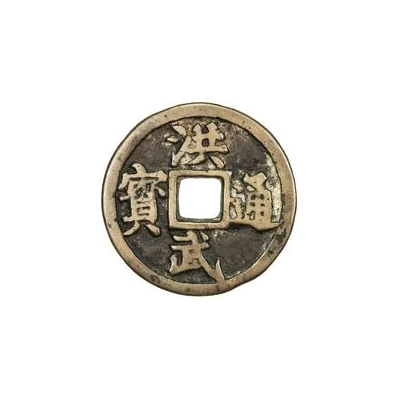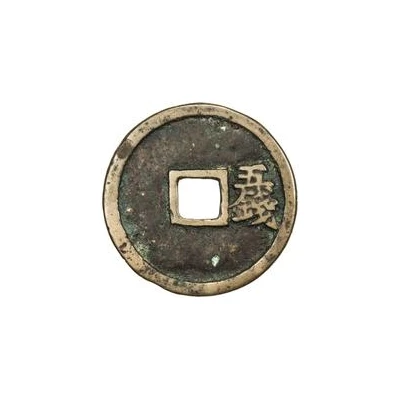


© Stephen Album Rare Coins
5 Cash - Hongwu Tongbao; with Wu Qian ND
| Bronze | 15.47 g | 40 mm |
| Issuer | Empire of China |
|---|---|
| Emperor | Ming dynasty › Hongwu (明太祖) (1368-1398) |
| Type | Standard circulation coin |
| Years | 1368-1393 |
| Value | 5 Cash |
| Currency | Cash (621-1912) |
| Composition | Bronze |
| Weight | 15.47 g |
| Diameter | 40 mm |
| Shape | Round with a square hole |
| Technique | Cast |
| Orientation | Medal alignment ↑↑ |
| Demonetized | Yes |
| Updated | 2024-10-04 |
| Numista | N#58035 |
|---|---|
| Rarity index | 95% |
Reverse
Two Chinese ideograms to the right.
Script: Chinese (traditional, regular script)
Lettering:
五
銭
Translation:
Wu Qian
5 Qian (weight of 5 Cash)
Edge
Plain
Comment
Casting of Hongwu coins started in 1368, but was not continuous. Large coins were discontinued in 1371, with all minting being suspended from 1375 to 1376, then again from 1387 to 1389 (that time due to a copper shortage). Minting was finally stopped again in 1393 in favour of paper money.Interesting fact
One interesting fact about the Standard circulation coin 5 Cash - Hongwu (Tongbao; with Wu Qian) ND (1368-1393) from Empire of China made of Bronze weighing 15.47 g is that it was used as a form of currency during the Hongwu Emperor's reign, who was the founder of the Ming dynasty. The coin was first introduced in 1368 and was used until 1393. The coin's design features the Chinese character "Wu" on one side and the Emperor's reign title "Hongwu" on the other. The coin was made of bronze and had a round shape with a square hole in the center. It weighed 15.47 grams and had a diameter of 2.5 centimeters. The coin was widely used in trade and commerce during that time and was an important part of the Chinese economy.